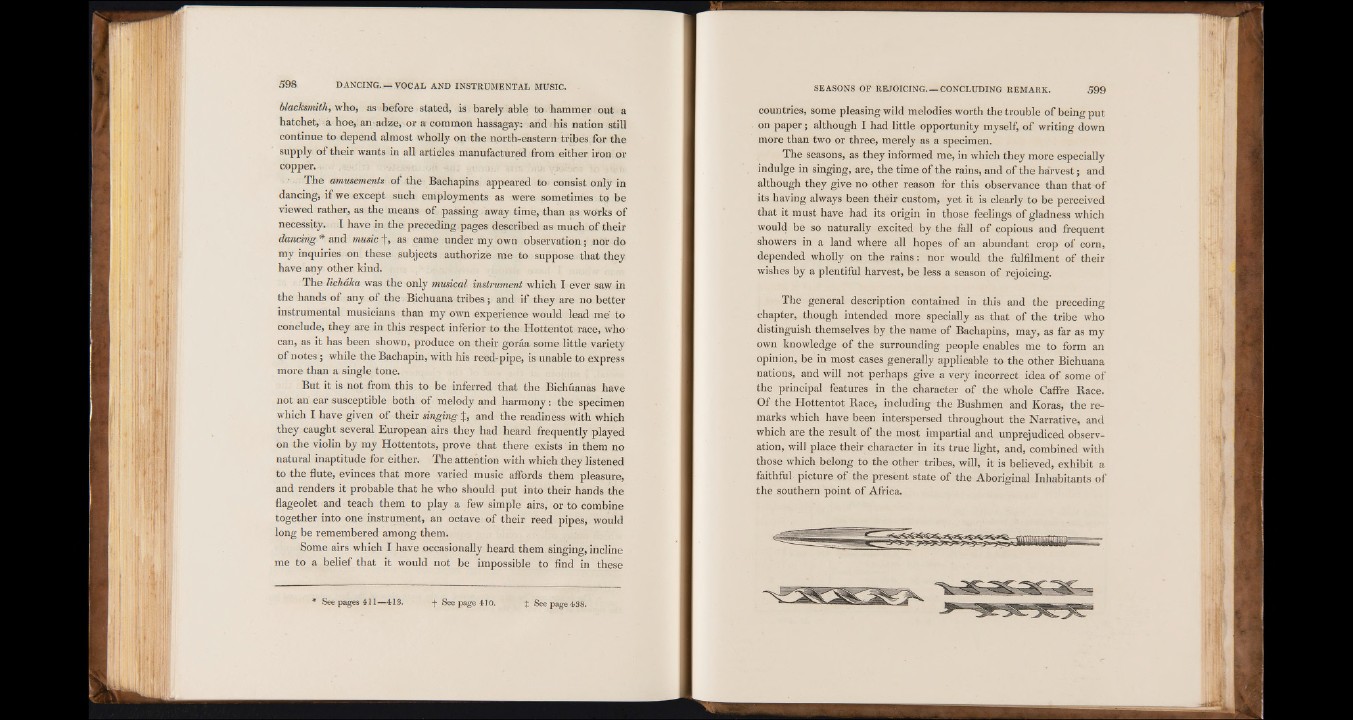
5 98 DANCING. — VOCAL AND INSTRUMENTAL MUSIC.
blacksmith, who, as before stated, is barely able to hammer out a
hatchet, a hoe, an adze, or a common hassagay: and his nation still
continue to depend almost wholly on the north-eastern tribes for the
supply of their wants in all articles manufactured from either iron or
copper.
The amusements of the Bachapins appeared to consist only in
dancing, if we except such employments as were sometimes to be
viewed rather, as the means of passing away time, than as works of
necessity. I have in the preceding pages described as much of their
dancing* and music f, as came under my own observation; nor do
my inquiries on these subjects authorize me to suppose that they
have any other kind.
The lichdka was the only musical instrument which I ever saw in
the hands of any of the Bichuana tribes; and if they are no better
instrumental musicians than my own experience would lead me to
conclude, they are in this respect inferior to the Hottentot race, who
can, as it has been shown, produce on their goraa some little variety
of notes; while the Bachapin, with his reed-pipe, is unable to express
more than a single tone.
But it is not from this to be inferred that the Bichuanas have
not an ear susceptible both of melody and harmony: the specimen
which I have given of their singing %, and the readiness with which
they caught several European airs they had heard frequently played
on the violin by my Hottentots, prove that there exists in them no
natural inaptitude for either. The attention with which they listened
to the flute, evinces that more varied music affords them pleasure,
and renders it probable that he who should put into their hands the
flageolet and teach them to play a few simple airs, or to combine
together into one instrument, an octave of their reed pipes, would
long be remembered among them.
Some airs which I have occasionally heard them singing, incline
me to a belief that it would not be impossible to find in these
‘ Seepages 411—413. f See page 410. t See page 438.
SEASONS OF REJOICING CONCLUDING REMARK. 5 9 9
countries, some pleasing wild melodies worth the trouble of being put
on paper; although I had little opportunity myself, of writing down
more than two or three, merely as a specimen.
The seasons, as they informed me, in which they more especially
indulge in singing, are, the time of the rains, and of the harvest; and
although they give no other reason for this observance than that-of
its having always been their custom, yet it is clearly to be perceived
that it must have had its origin in those feelings of gladness which
would be so naturally excited by the fall of copious and frequent
showers in a land where all hopes of an abundant crop of corn,
depended wholly on the rains: nor would the fulfilment of their
wishes by a plentiful harvest, be less a season of rejoicing.
The general description contained in this and the preceding
chapter, though intended more specially as that of the tribe who
distinguish themselves by the name of Bachapins, may, as far as my
own knowledge of the surrounding people enables me to form an
opinion, be in most cases generally applicable to the other Bichuana
nations, and will not perhaps give a very incorrect idea of some of
the principal features in the character of the whole Caffre Race.
Of the Hottentot Race, including the Bushmen and Koras, the remarks
which have been interspersed throughout the Narrative, and
which are the result of the most impartial and unprejudiced observation,
will place their character in its true light, and, combined with
those which belong to the other tribes, will, it is believed, exhibit a
faithful picture of the present state of the Aboriginal Inhabitants of
the southern point of Africa.